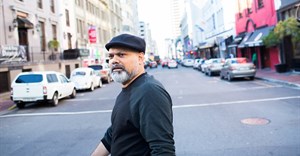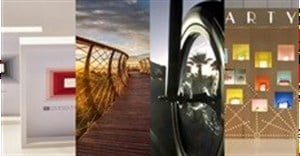Trending




 6 tips to help scale up your small businessGrant Lapping
6 tips to help scale up your small businessGrant Lapping
[Design Indaba 2015] Reinventing the wheel and other stories
A new definition of design
The word design may be many things to many people, but one thing it is not, is limited to the domain of people trained in design. Design now is about being human on a shared planet and finding news ways of profoundly enhancing quality of life through creative thinking. In fact a new definition of design could perhaps be: "People, products, actions or interfaces that positively influence social, cultural or economic outcomes".
![[Design Indaba 2015] Reinventing the wheel and other stories](https://biz-file.com/c/1502/262015.jpg)
In his welcoming address, Thulani Sibeko (@sibeko_thulani) Marketing, Communication ?executive of chief sponsor Nedbank, was heard to mention that economic models in our region, may be shifting from mining metals to mining ideas. And on the topic of ideas...
1. An idea will never, ever, ever work if you don't try it - Joe Public
It has become a Design Indaba custom for a local agency or individual to take up the first slot of the three-day event. This year fell to Joe Public (@joepublicagency), whose distinctive Take Away Restaurant concept first challenged traditional advertising agency models in 1998 and who have become known for having positive social change as their raison d'etre ever since.
A recent stand out example addresses the problem of dysfunctional school outcomes in South Africa due to English being taught as a second language in most schools and universities. This is obviously a major barrier to comprehension especially in subjects such as Science and Maths, which are taught in English only. The agency's One School at a Time (@OSAAT_SA) One School at a Time initiative among others, has been achieving radically improved educational outcomes, proving the inspirational quote offered by presenters Xoliswe Dyeshana and Pepe Marais "An idea will never, ever, ever work if you don't try it", a rallying cry against fear, defeatism and apathy.
2. Reinventing the wheel
Scarce resources and inadequate infrastructure provide the creative impetus for Malawian designer Ackeem Ngwenya to tackle the problem of reduced access to markets for produce due to poor quality of roads in his home village, via his RCA project to design a better wheel.
Ironically disproving the very cliché of stasis - "No need to reinvent the wheel." In this instance Ngwenya tackles the need for a cheap, robust puncture proof product and succeeds in reinventing the wheel, for use on rutted and uneven road surfaces, via an ingenious adjustable wireframe matrix placed inside up-cycled tyres, offering a puncture proof product with variable ground clearance, which could succeed in changing economic reality for many!
3. Changing people's lives one chicken at a time - Robbie Brozin, co-founder and former CEO Nando's
Robbie Brozin is an example of someone who does not define himself as a designer, but who nevertheless appeared on the Design Indaba stage for achieving the required positive social, cultural and economic outcomes with his ethos "If you are not in business to change people's live, what are you doing?"
Starting from one out-of-the-way Portuguese Restaurant in Johannesburg's unfashionable suburb of Rosettenville amid the political unrest of South Africa in 1987, the irreverent brand made a household name locally by Net#workBBDO's legendary advertising campaigns, has in 28 years grown to over 1000 outlets, employing 30,000 people with over 250 outlets in the UK and afar afield as Fiji, Malaysia, Ireland, Canada and Dubai.
More recently the company and Brozin, are leveraging this economy of scale, seeing design and art as a means to add value to the brand experience - he cites new "magnificent interiors" as designed to "inspire the grillers to grill magnificent chicken". The company is also pledging to have 5% SA-made furniture in their worldwide stores in future and in so doing will be acting as global showcase of the best of SA art, interior design, handcraft and music, such as Tracy Lynch interiors, John Vogel chairs, du Noon Weavers and many more - continuing to grow, sustain and promote the excellence of our region and our people by design - which, is not too shabby for a chicken.
4. Food and Twitter profoundly alter LA's cultural and social landscapes
More food for social change, this time from Roy Choi, formerly one of LA's top chefs who tells the story of the profound and moving social changes affected by Kogi, his Korean taco truck venture.
Behind the Los Angeles stereotypes of Hollywood, Beverley Hills etc explains Choi, is a sub-culture of complete freedom created in part by the thousands of behind the scenes designers, post production, artists and so on, who support the Hollywood machine. Add to this, the other sub-culture of street, hip-hop and hustle which currently shapes American underside and a bigger picture starts to form.
Losing his job in a top restaurant proved a blessing in disguise for Choi, persuaded by a friend to join him in the taco truck venture. His integrity, love of food and of feeding people soon led to a devoted following, fuelled by the fledgling Twitter company, which was understood at the time mostly by the techies frequenting the Bay Area. Choi describes the early promotion of the truck's intended location via Twitter as throwing out a message a bottle and which would result in 600 - 700 people waiting for its arrival - stimulating cultural diversity via a new means of collective intelligence.
Choi has his sights set on greater change yet, "to flip the fast food business on its head", subverting it with his style of nutritious nurturing fare and aiming to take back the streets from companies like KFC and McDonalds "which are poisoning our communities". [Design Indaba audience cheers]
Another cultural change wrought by the venture is the complete rethinking of the food trucks themselves, previously known by the prejudiced term "roach coaches", Choi says his biggest achievement is that thanks to the Kogi phenomenon, this disparaging term will disappear forever from use.
Another example of design shifting social, economic and cultural behaviour.
Think like a designer to make change, think like Pepe, Xoliswe, Ackeem Robbie and Roy - make something, be passionate, see potential, be fascinated by everything, do everything your best, add value, be inspiring, inspired and useful, put others first, be considerate, collaborate to grow - this is what the best designers bring to the table. As resources become scarcer and global politics and economics more uncertain, we underestimate these new opportunities available to us at our peril.








![[Design Indaba 2015] Conference highlights - Day three](https://biz-file.com/c/1502/262237-300x156.jpg)
![[Design Indaba 2015] Conference highlights - Day two](https://biz-file.com/c/1502/262225-300x156.jpg)
![[Design Indaba 2015] The Internet of Things](https://biz-file.com/c/1503/262356-300x156.jpg)
![[Design Indaba 2015] On fashion and identity at Design Indaba 2015](https://biz-file.com/c/1503/262410-300x156.jpg)